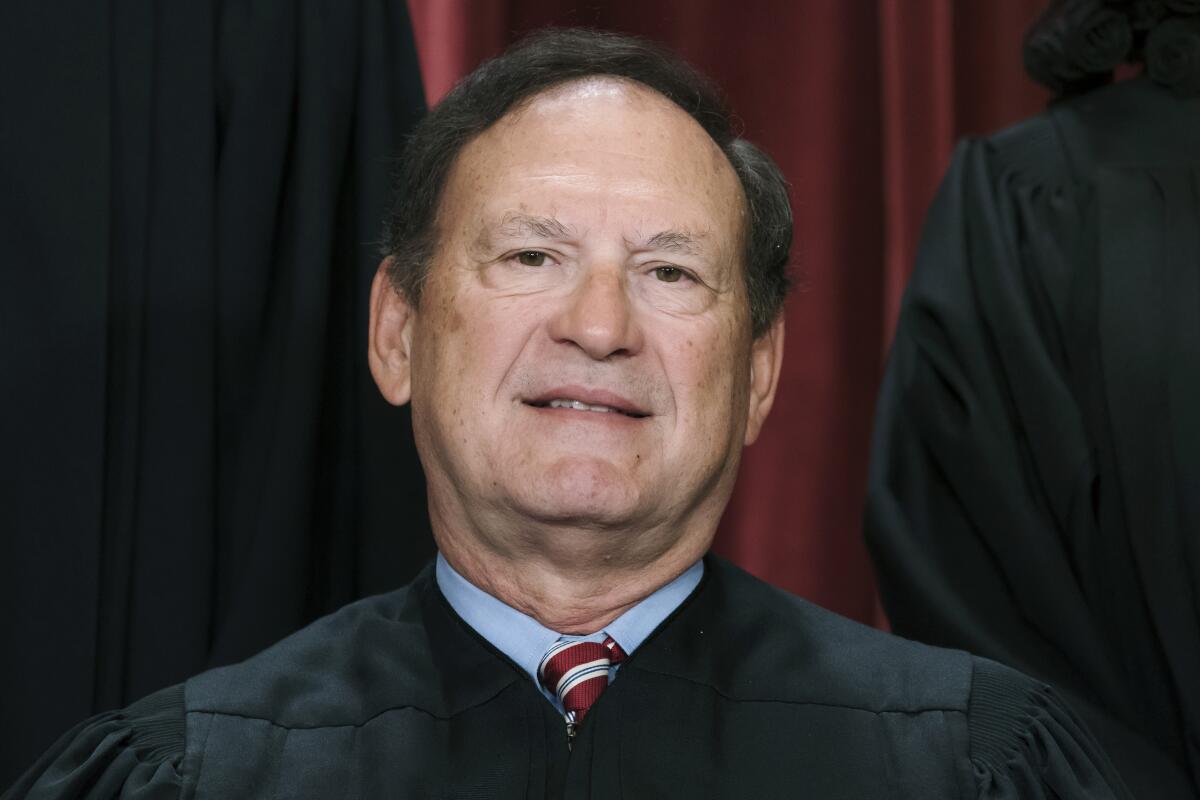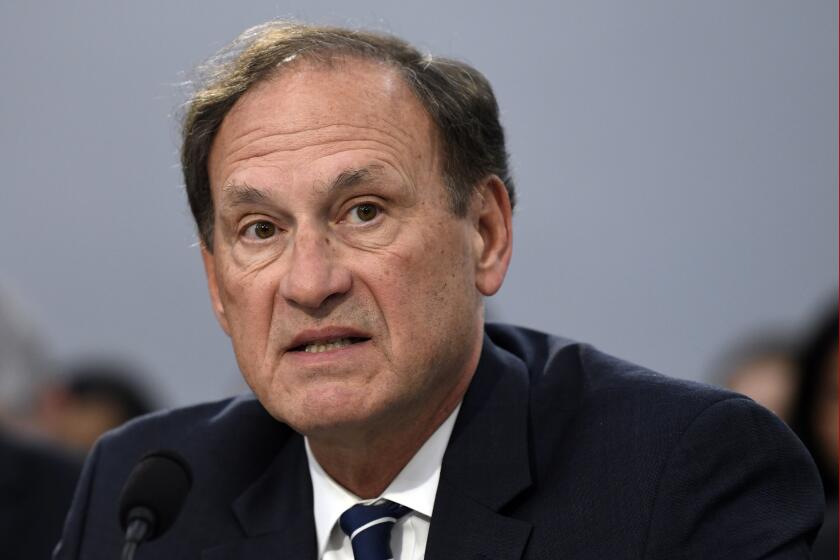Column: Why does Justice Alito keep making things worse for the Supreme Court?

- Share via
Amid all the attention paid lately to the now thrice-indicted former president, the first in U.S. history to defy voters’ will, spare some time for the recent outrages of yet another major actor in our political theater.
Supreme Court Justice Samuel A. Alito Jr.
Opinion Columnist
Jackie Calmes
Jackie Calmes brings a critical eye to the national political scene. She has decades of experience covering the White House and Congress.
Just over a week ago, the justice viewed on and off the bench as the court’s crank took to the embracing environs of the Wall Street Journal’s far-right opinion pages to vent his spleen against his and the conservative court’s critics — for the third time in as many months. “Samuel Alito, the Supreme Court’s Plain-Spoken Defender” was the congenial headline for its latest article based on interviews with the justice.
What Alito told a Journal editor and a conservative writer in the interview was certainly controversial; the justice said so himself: “I know this is a controversial view, but I’m willing to say it: No provision in the Constitution gives [Congress] the authority to regulate the Supreme Court — period.”
That’s flat-out wrong but it’s the kind of imperious pronouncement you get from a justice who has been eager to overturn landmark court decisions, such as the 49-year-old right to abortion.
Justice Samuel Alito says that Congress lacks the power to impose a code of ethics on the Supreme Court.
Alito’s remarks underscored the appearance of partisanship, judicial arrogance and blindness to potential conflicts of interest that court critics across the spectrum are complaining about. (The interviewer in the Journal article, David B. Rivkin Jr., is a lawyer with a case pending before the court.)
Those complaints, and recent exposes in ProPublica of Alito’s and Justice Clarence Thomas’ unreported, all-expense-paid vacations with conservative billionaires who have interests at the court, have prompted Democrats in Congress to propose ethics legislation for the justices.
Typically, justices don’t opine on pending legislation. But Alito isn’t a typical justice. And, boy, did he opine negatively about the ethics bill. It’s pretty rich that he’s criticizing Congress even as he objects to Congress’ criticizing him.
Alito’s absolutist reading of the Constitution’s separation of powers — his assertion that Congress has no authority over the court — stunned many legal scholars.
The conservative who wrote fiery opinions overturning Roe vs. Wade and dissenting on LGBTQ+ rights can’t stand criticism for his free fishing trip or anything else.
“This claim is not just ‘controversial’; it’s utterly wrong as a matter of constitutional text, longstanding historical practice, and even the most basic understanding of the separation of powers,” Stephen Vladeck, a law professor at the University of Texas at Austin, wrote Thursday in his Substack newsletter.
He cited three provisions in the Constitution empowering Congress to regulate the court in myriad ways. For example, the number of justices, the oath they take, where and when they meet, their budget, salary and retirement benefits — all set by Congress. Congress defines the scope of cases the court takes on appeal, which is most of what the justices do.
Also, Congress has mandated that justices report their finances and gifts and recuse themselves from cases when they appear to have a conflict of interest, but there’s little in the way of an enforcement mechanism. Alito and other justices say they comply with the reporting and recusal rules “voluntarily,” despite examples to the contrary, like the unreported vacations.
Finally, but not least, Congress can impeach and remove a justice from office.
Justice Antonin Scalia’s impact on the Supreme Court includes forging the way for justices to accept free trips —something that has entangled Clarence Thomas and Samuel A. Alito Jr.
Why would Alito assert Congress’ impotence over the court given all this? Vladeck’s guess is mine as well: The justice may be trying to “fire up” Republicans in Congress, and arm them to oppose the ethics bill.
Stay tuned for Republican senators quoting Alito on the subject. But they hardly need his help; Republicans can easily kill the bill by filibuster in the Senate or by their House majority refusing to consider it.
What Alito apparently doesn’t grasp is that his injudicious comments actually provide ammunition to the court’s critics.
Vladeck quipped that when Alito whines that those critics, not the justices, are the ones undermining confidence in the Supreme Court’s legitimacy, he comes off like the guy in the Netflix video wearing a hot dog suit, after a hot dog-mobile has crashed into a store, telling startled customers, “We’re all trying to figure out who did this.”
Saying no to gifts and offers isn’t that hard, especially when your job and an institution’s credibility is on the line.
Indeed, Alito’s view allows for no chance that the justices’ behavior off the court or the supermajority’s zeal to overturn or weaken longstanding, progressive rights might be contributing to the court having the lowest approval rating since polling began decades ago.
Alito recently spent four hours airing his gripes to the Journal. It also published his op-ed assailing ProPublica for its story on his Alaska getaway with billionaire Republican donor Paul Singer, before the story was even published. Alito refused to speak with the ProPublica reporters.
Secular families with children still worry people like Samuel Alito. I can assure him: We’re trying to raise empathetic, moral kids.
Alito told the Journal writers that he could no longer be “mute” because “the organized bar” was failing to defend the court as it should. In fact, the American Bar Assn. in February joined the push for a binding ethics code for the justices, saying its absence “imperils the legitimacy of the Court.”
It’s hard to explain why Alito is so full of bile, not only toward critics but also, in his court writings, toward colleagues who disagree with him, conservative or liberal. Given the court’s makeup now, what’s not to like for Sam Alito?
He’s part of a right-wing supermajority that’s on a roll and likely will hold power for decades.
Be judicious, Mr. Justice: Give it a rest.
More to Read
Get the latest from Jackie Calmes
Commentary on politics and more from award-winning opinion columnist.
You may occasionally receive promotional content from the Los Angeles Times.

















